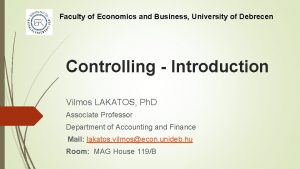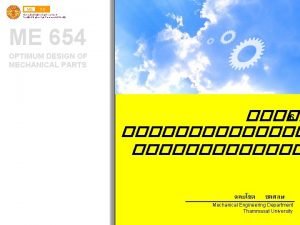UNIVERSITY OF MONTENEGRO THE FACULTY OF ECONOMICS ENGLISH




































- Slides: 36

UNIVERSITY OF MONTENEGRO THE FACULTY OF ECONOMICS ENGLISH FOR SPECIFIC PURPOSES Podgorica, 05. 03. 2018.

GRAMMAR IN USE

SPEAKING ACTIVITY

SPEAKING ACTIVITY

SPEAKING ACTIVITY




I TRANSLATE THE FOLLOWING SENTENCES: Niko ne želi da ulaže u sjever. Možda jer se investitori plaše visokih poreza. . . . . . . Vjerovatno će svi radnici stupiti u štrajk. . . . . . . Rukovodioci nemaju dobar odnos sa zaposlenima. . . . . . . Možda nije ekonomično zadržati fabrike u Aziji. . . . . . . Kompanije zapošljavaju samo obučene radnike i zbog toga je nezaposlenost visoka. . . . . . .

I TRANSLATE THE FOLLOWING SENTENCES: 1. No one invests in the North. Maybe because investors are afraid of high taxes. 2. Probably all the workers will go on strike. 3. Managers don’t have good relations with their emloyees. 4. Maybe it is not economical to keep the factories in Asia. 5. Companies employ only skilled workers and that is why unemployment is high. . . . . . .

SPEAKING ACTIVITY

SPEAKING ACTIVITY

SPEAKING ACTIVITY

WRITING ACTIVITY



Passive Voice

Passive Voice Why use the Passive? To emphasize the object or party receiving the action • Rebecca was selected for a free gift. To emphasize the action instead of the actor • Our car was repaired by our neighbor. When the agent (doer) is unknown or not important • Her house was broken into last night.

Passive Voice Structure There are two main rules to all Passive Voice forms: 1. Use the Past Participle form of the main verb 2. Add the verb “Be” in the same tense as the sentence in its active voice form

Passive Voice Structure She plays tennis. SIMPLE PRESENT TENSE – so use the Simple Present tense of verb TO BE (am, is, are) We must use PAST PARTICIPLE V + ED III COLUMN TENNIS AM, IS, ARE PLAYED. TENNIS IS PLAYED.

Passive Voice Structure LEARNING PASSIVE IN THREE STEPS: STEP ONE: Find OBJECT of the sentence. They are watching TV. She bought a book. They had called her.

Passive Voice Structure LEARNING PASSIVE IN FIVE STEPS: STEP TWO: PUT THE MAIN VERB IN PAST PARTICIPLE FORM. They watch TV every night. watch - watched

Passive Voice Structure LEARNING PASSIVE IN FIVE STEPS: STEP THREE: USE VERB TO BE! THE FORM OF VERB TO BE DEPENDS ON THE TENSE OF THE ACTIVE SENTENCE! SIMPLE PRESENT - AM, IS, ARE

GRAMMAR IN USE

GRAMMAR IN USE

GRAMMAR IN USE VERB TO BE + PAST PARTICIPLE VERB TO BE: AM, IS, ARE PAST PARTICIPLE: V + ED (pravilni) III kolona (nepravilni glagoli)

GRAMMAR ACTIVITY





Complete the sentences (Active or Passive Voice). Use Simple Present. He (sell) cars. The blue car (sell). In summer, more ice-cream (eat) than in winter. She (call) her grandparents every Friday. The letters (type). He (take) his medicine every day. Jane (take) to school by her father. We (go) to school by bus. She (work) for a bank. Milk (keep) in the refrigerator.




THAT’S ALL FOLKS. THANK YOU FOR COMING! SEE YOU NEXT WEEK.
 University of montenegro faculty of law
University of montenegro faculty of law Mendel university faculty of business and economics
Mendel university faculty of business and economics University of debrecen faculty of economics and business
University of debrecen faculty of economics and business Faculty of business and economics mendel university in brno
Faculty of business and economics mendel university in brno Montenegro university
Montenegro university Maastricht university school of business and economics
Maastricht university school of business and economics Faculty of economics and business zagreb
Faculty of economics and business zagreb University of split faculty of maritime studies
University of split faculty of maritime studies University of bridgeport computer science faculty
University of bridgeport computer science faculty University of bridgeport computer science
University of bridgeport computer science Hubert kairuki memorial university faculty of medicine
Hubert kairuki memorial university faculty of medicine Solid thyroid nodule
Solid thyroid nodule Applied medical sciences
Applied medical sciences Florida state university ms in cs
Florida state university ms in cs Singularity executive program
Singularity executive program Semmelweis university faculty of medicine
Semmelweis university faculty of medicine Masaryk university medical faculty
Masaryk university medical faculty Faculty of engineering university of porto
Faculty of engineering university of porto Webkredit cuni
Webkredit cuni Faculty of veterinary medicine cairo university logo
Faculty of veterinary medicine cairo university logo Faculty of law of the university of zagreb
Faculty of law of the university of zagreb University of kragujevac faculty of technical sciences
University of kragujevac faculty of technical sciences University of cologne faculty of management
University of cologne faculty of management Leading university teacher
Leading university teacher Hacettepe university faculty of medicine
Hacettepe university faculty of medicine Brown university computer science faculty
Brown university computer science faculty Faculty of veterinary medicine - university of tehran
Faculty of veterinary medicine - university of tehran Semmelweis university faculty of medicine
Semmelweis university faculty of medicine Lebanese university roumieh
Lebanese university roumieh Myfile york university
Myfile york university Clemson university electrical engineering
Clemson university electrical engineering Faculty of veterinary medicine cairo university
Faculty of veterinary medicine cairo university Faculty of mechanical engineering thammasat university
Faculty of mechanical engineering thammasat university Chronic meningitis
Chronic meningitis Mahidol university public health
Mahidol university public health Thin and thick smear
Thin and thick smear Faculty of education khon kaen university
Faculty of education khon kaen university


























































